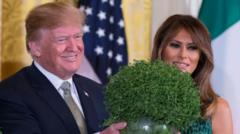Every year as St. Patrick's Day approaches, a long-standing tradition sees politicians, business leaders, and influencers from Ireland converge on Washington, D.C. This ritual, marked by the presentation of a bowl of shamrock to the U.S. president, is about more than just festivity; it reinforces key economic and diplomatic relationships between the island of Ireland and the United States.
However, this year's festivities are clouded by political divides. Some Northern Ireland representatives are choosing to skip the trip in response to the Trump administration's controversial policies, notably regarding the Israel-Gaza conflict. In contrast, other leaders stress the necessity of maintaining ties with U.S. officials to bolster investment and support for Northern Ireland's economy.
Irish politicians, such as Steve Aiken and former Sinn Féin member Máirtín Ó Muilleoir, emphasize the significance of in-person meetings. Aiken argues that face-to-face interactions are essential for meaningful engagements that virtual formats fail to deliver. He recalls the limitations of relationship-building during the pandemic, underscoring the unique advantages of personal presence in Washington.
The political climate surrounding St. Patrick's Day allows Irish voices to resonate more distinctly in U.S. discourse, marked by American corporations promoting Irish culture. Events garnished with shamrock imagery provide an opportune backdrop for Irish representatives to advocate for financial support and highlight potential investments—an angle Ó Muilleoir, with the experience of previous visits, affirms is ripe for exploration.
The meeting between the Irish Taoiseach and the U.S. president symbolizes the ongoing collaboration necessary for both political advancements and economic growth. While past visits have facilitated crucial discussions leading to the Good Friday Agreement, the measurable outcomes of these annual journeys remain nebulous. According to economists, elucidating a direct correlation between these visits and tangible economic benefits is challenging.
As participation fluctuates amid the political landscape, the importance of keeping Irish interests relevant in U.S. politics becomes paramount. Once, Irish-Americans held prominent positions in the U.S. government, but changing demographics and global issues have led to heightened competition for attention.
Despite the fallout with some political factions distancing themselves from this year's events, leaders like Deputy First Minister Emma Little-Pengelly argue for the need to nourish relationships with the U.S. As the St. Patrick's Day celebrations unfold, so too does a complex interplay of advocacy, investment potential, and political ideologies that will shape the future of Irish-American diplomacy.





















